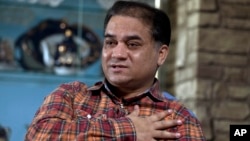The United States has called on China to release Uighur rights activist and economics professor Ilham Tohti, who was charged Wednesday with separatism two days after clashes in Xinjiang that caused dozens of casualties. The head of a U.S./based Uighur group said the Muslim Uighur community is rising up against China’s recently-announced crackdown.
U.S. State Department spokeswoman Marie Harf Wednesday expressed concern about Ilham Tohti’s indictment, as well as his detention and that of six students since January:
"We have been deeply concerned about the lack of transparency concerning his welfare and access to legal representation. We call on Chinese authorities to release Mr. Tohti and his students and to guarantee them the protections and freedoms to which they are entitled under China’s international human rights commitments, including freedom of expression," said Harf.
Charged with separatism
China’s state-run Global Times newspaper said the former lecturer at Beijing’s Central Nationalities University, detained January 15 and transferred to Xinjiang, was charged Wednesday with separatism for reportedly having close ties to the World Uighur Congress, which it said advocates the independence of Xinjiang. Police also say Tohti has connections with the East Turkestan Islamic Movement, which has been designated a terrorist group.
According to state media, Tohti has described Muslim Uighur protesters as heroes and instigated students to hate China and its government. He is said to have been arrested several times for spreading rumors.
Michael Clarke, senior research fellow at Australia’s Griffith Asia Institute, said while he expected Tohti to be indicted, he is surprised his trial will be heard in the Intermediate People’s Court in Urumqi.
"In most cases, particularly high-profile cases like this, a conviction is pretty much a guarantee here and the problem with that is the charge of separatism, or inciting separatism, can technically carry the death penalty under Chinese law," explained Clarke. "Whether or not that will be the case in this circumstance, obviously, is unclear at the present."
Denied food, mistreated
Clarke said Tohti has never engaged in any activity that might be defined as separatism or inciting separatism. "In fact, in his position as a professor of economics in Beijing, he was quite a moderate spokesman for Uighur autonomy and a reasonably moderate critic of the government’s approach to Xinjiang more broadly. The government, however, has charged him with a variety of things, and they’ve also accused him of using his position as a professor, and I’m quoting the official story here, to make rumors, distort and hype up stories to create conflicts, spread separatist thinking, incite ethnic hatred, advocate Xinjiang independence and conduct separatist activities," he said.
Alim Seytoff, president of the Uighur American Association, said the timing of the indictment may be a way that Chinese authorities can deflect attention away from the latest violence in the restive western autonomous region that borders Central Asia. Seytoff said Tohti has been detained incommunicado (unable to communicate) for six months.
"And, he was even chained by the Chinese prison authorities and he was denied food for 10 days. So, he was abused and mistreated by the Chinese authorities," Seytoff stated.
Seytoff said Tohti had operated a website aimed at reconciling the Uighur and Chinese peoples and sought to change China’s policy of, what Seytoff calls, heavy-handed repression in Xinjiang.
On a visit to Xinjiang in April, President Xi Jinping called for "decisive actions" to "resolutely repress the terrorists’ rampant momentum."
Tuesday, China reported that dozens of civilians had been killed or wounded in what it calls a terrorist attack Monday in Xinjiang’s Kashgar Prefecture. It said a gang armed with knives attacked a police station and government offices, as well as civilians, and smashed vehicles. It said police responded by shooting dozens of members of the mob. It said its initial investigation concluded it was a premeditated terror attack.
Chinese crackdown
Seytoff said the police action is part of China’s year-long anti-terror campaign initiated by President Xi.
"The Chinese government restricted the fasting during the holy [Muslim] month of Ramadan, which is one of the five pillars of Islam. Instead, the Chinese security forces went house-to-house searching Uighurs who were fasting, harassing them at night, locking up Uighurs who prayed, and even killed a family of Uighurs," he said. "As a result of this mass grievance and anger toward Chinese security forces, especially extra-judicial use of force, they took to the streets to protest against brutality."
Seytoff said this is a reflection of what he called Uighur "collective discontent" and said both peaceful and violent actions are happening throughout the Uighur community. He acknowledged he is fearful of another crackdown similar to what occurred in July, 2009, when some 200 people were killed in the regional capital, Urumqi.
In May, at least 31 people were killed when two cars crashed through an Urumqi market and explosives were thrown. In March, a mass stabbing at a Kunming train station blamed on Muslim extremists wielding knives killed 29 people. In all, nearly 200 people have been killed in ongoing violence tied to the Uighur community in China this year.




